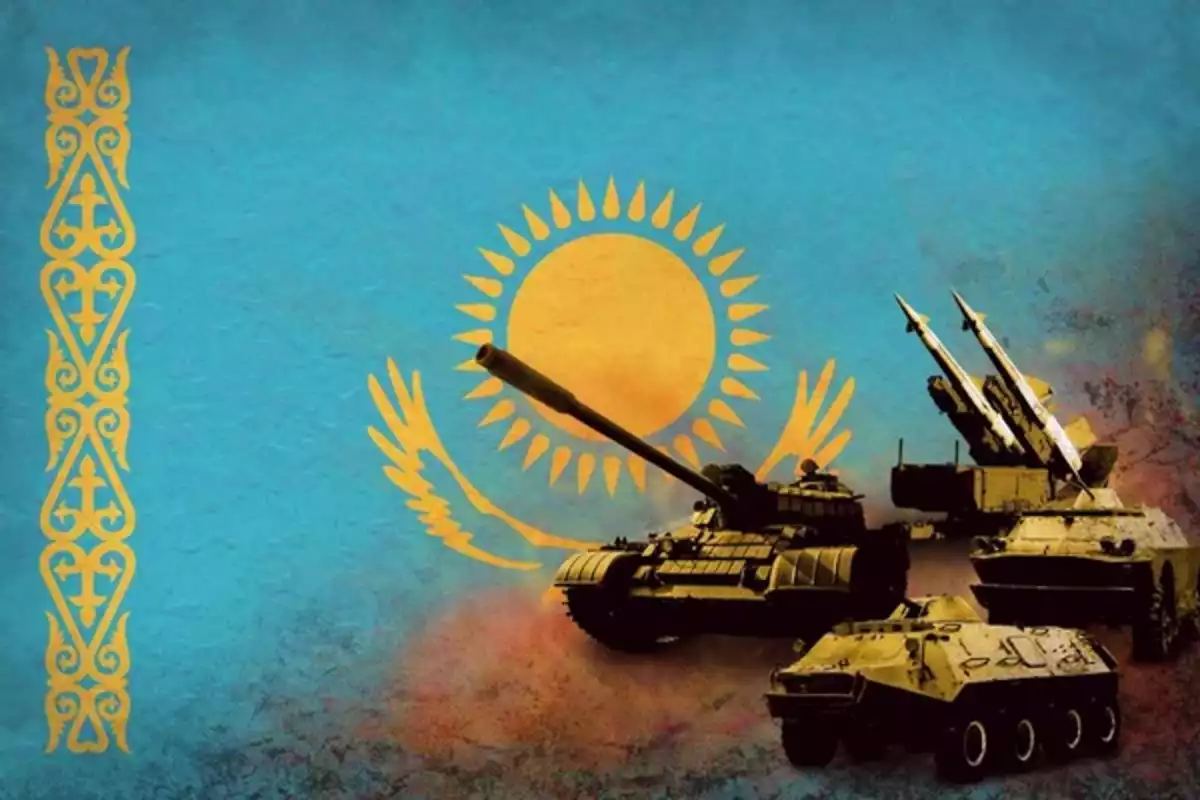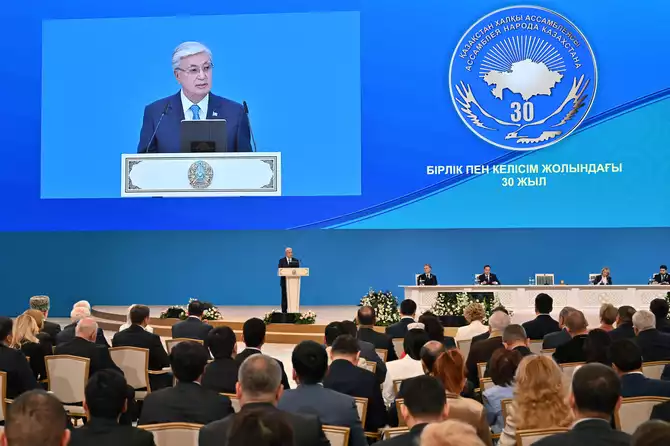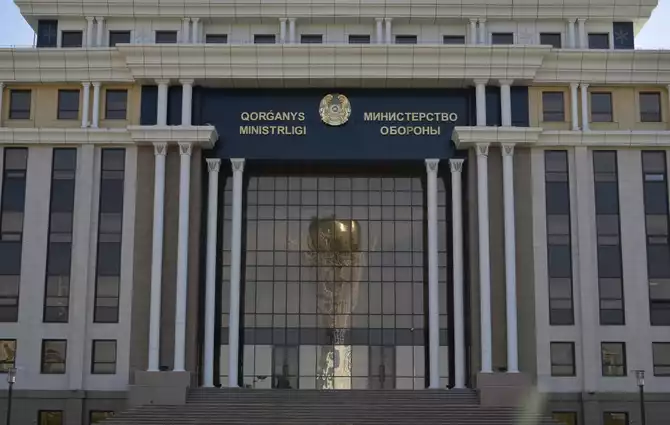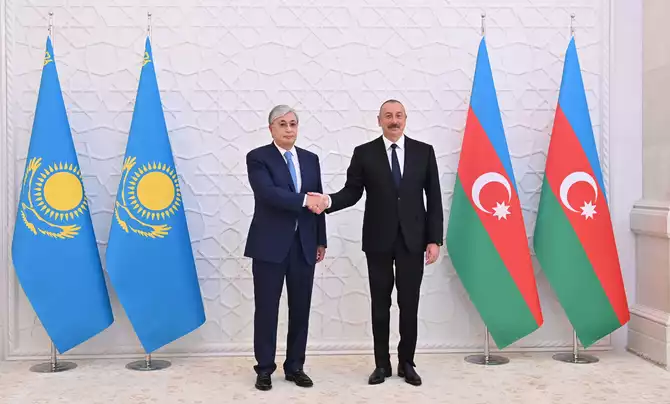
Photo: Depositphotos
On April 24, President of Kazakhstan Kassym-Jomart Tokayev addressed the 34th session of the Assembly of the People of Kazakhstan (APK), which marked its 30th anniversary this year. Analysts noted a series of accompanying insinuations, primarily originating from abroad, in the lead-up to this event. These narratives were not only contradictory but often directly opposed to each other.

Photo credit: akorda.kz
At the end of March, certain opposition forces abroad actively disseminated information via social media, claiming that during the April session of the APK a referendum might be announced-either on Kazakhstan’s "accession to Russia" or on the formation of a "union state" with Russia and Belarus. However, shortly before the session, some foreign media outlets reported that Kazakhstan was allegedly planning to deploy the largest territorial defense brigade grouping along its border with Russia "in case of a conflict with Russia." These claims referenced the draft law "On Territorial Defense of the Republic of Kazakhstan," which was approved by the Majilis (the lower house of Parliament) in its second reading on April 16 and forwarded to the Senate for consideration.
The draft law designates territorial defense as a separate domain, defining the forces and resources required to fulfill tasks in this area. It assigns the Ministry of Defense (MoD) the responsibility for state oversight in the field and introduces new concepts such as "volunteer" and "self-defense formation" into the country’s defense system. The draft law provides for the possibility of Kazakhstani citizens voluntarily joining self-defense formations during wartime.
On April 24, the Ministry of Defense of Kazakhstan issued a statement clarifying that the draft law was developed "as part of the modernization of the national security system," with the goal of "ensuring internal stability, protecting the population, infrastructure facilities, and territorial integrity in conditions of martial law or other emergency situations." The ministry emphasized that "the deployment of territorial defense brigades is based on logistical, geographical, and demographic characteristics of the regions, not in response to external threats." Therefore, the Ministry of Defense made clear that the draft law "is exclusively aimed at strengthening internal security" and "has no anti-Russian orientation."

Ministry of Defense of the Republic of Kazakhstan/Photo credit: LinkedIn
Thus, it appears that certain external forces made deliberate attempts to destabilize the situation within Kazakhstan in the context of the president’s anticipated speech at the APK session. This explains why Tokayev, in his address, placed particular emphasis on the fact that "certain so-called human rights organizations, bloggers, and journalists are essentially staging provocations." He pointedly added that this trend also involves "former citizens who have moved abroad and, from there, launch paid attacks against our nation, even attempting to blackmail our government agencies."
It is no secret that such individuals are simply "working off the foreign funding allocated to them. This is democracy, so to speak, funded from abroad." In this context, Tokayev urged people to clearly understand that Kazakhstan’s well-being "is of little concern to anyone abroad."
Undoubtedly recognizing the underlying intent of these insinuations, which sought to weaken Kazakhstan, Kassym-Jomart Tokayev once again stressed the importance of unity within society. In his speech, he developed a theme he had previously highlighted during the fourth meeting of the National Kurultai in March 2025, where he emphasized that amidst growing geopolitical tensions, it is vital to safeguard "the primary condition for our sustainable progress - national unity, social harmony, and stability."
On April 24, Tokayev attributed the surprise of foreign guests at Kazakhstan’s harmonious blend of diverse traditions and customs to the failure of multiculturalism and multi-ethnicity concepts in the West, which had retreated from "globalism in favor of isolationism." In contrast, Kazakhstan’s "practical experience reflects a unique worldview that is open to other cultures."
According to Tokayev, amid today’s global instability and the widespread "devaluation of human life," the idea of unity takes on extraordinary significance, and "we will continue to take systematic measures in this direction." He reiterated that "strengthening interethnic harmony and stability has been and will remain one of the main priorities of our state policy," stressing the inadmissibility of politicizing interethnic and interfaith relations and, "even more so, of any kind of provocations."
He stated that "thanks to this strategy, representatives of different nationalities live together in peace and harmony, like children of one family, under one common roof," and that "no one in Kazakhstan has the right to dictate in which language people should communicate in their personal conversations or public speeches." Therefore, "any provocative actions aimed at sowing discord within our society or destabilizing the country will be stopped and punished in accordance with the law." Tokayev specified that, in speaking of provocateurs, he referred not only to "domestic actors" but also to those "engaging in destructive activities from abroad on behalf of, and funded by, foreign organizations."

Kazakh President Kassym-Jomart Tokayev and Azerbaijani President Ilham Aliyev. Photo credit: Akorda
In this regard, Tokayev’s remarks resonate strongly with the themes outlined by President of Azerbaijan Ilham Aliyev in his 2024 inaugural speech. Aliyev emphasized the unity of the Azerbaijani people, highlighting that "national unity must be constant," especially as "the significance of Azerbaijan and its role in the world are growing." He warned that "ideological provocations against us will not only continue but are inevitable," particularly amid "attempts from various directions to undermine our unity, drive a wedge among us, and inject provocative ideas into our society." However, he declared resolutely, "their efforts will be in vain. Our unity stands - and will continue to stand - as a barrier to these efforts. Necessary steps will continue to be taken in this direction."
In conclusion, it is clear that President Tokayev has demonstrated his awareness of the forces behind the recent insinuations aimed at destabilizing Kazakhstan. At the same time, he called on the people of Kazakhstan to remain vigilant, resist the manipulations of foreign-sponsored forces, and actively nurture and protect the unity of the nation.
Share on social media